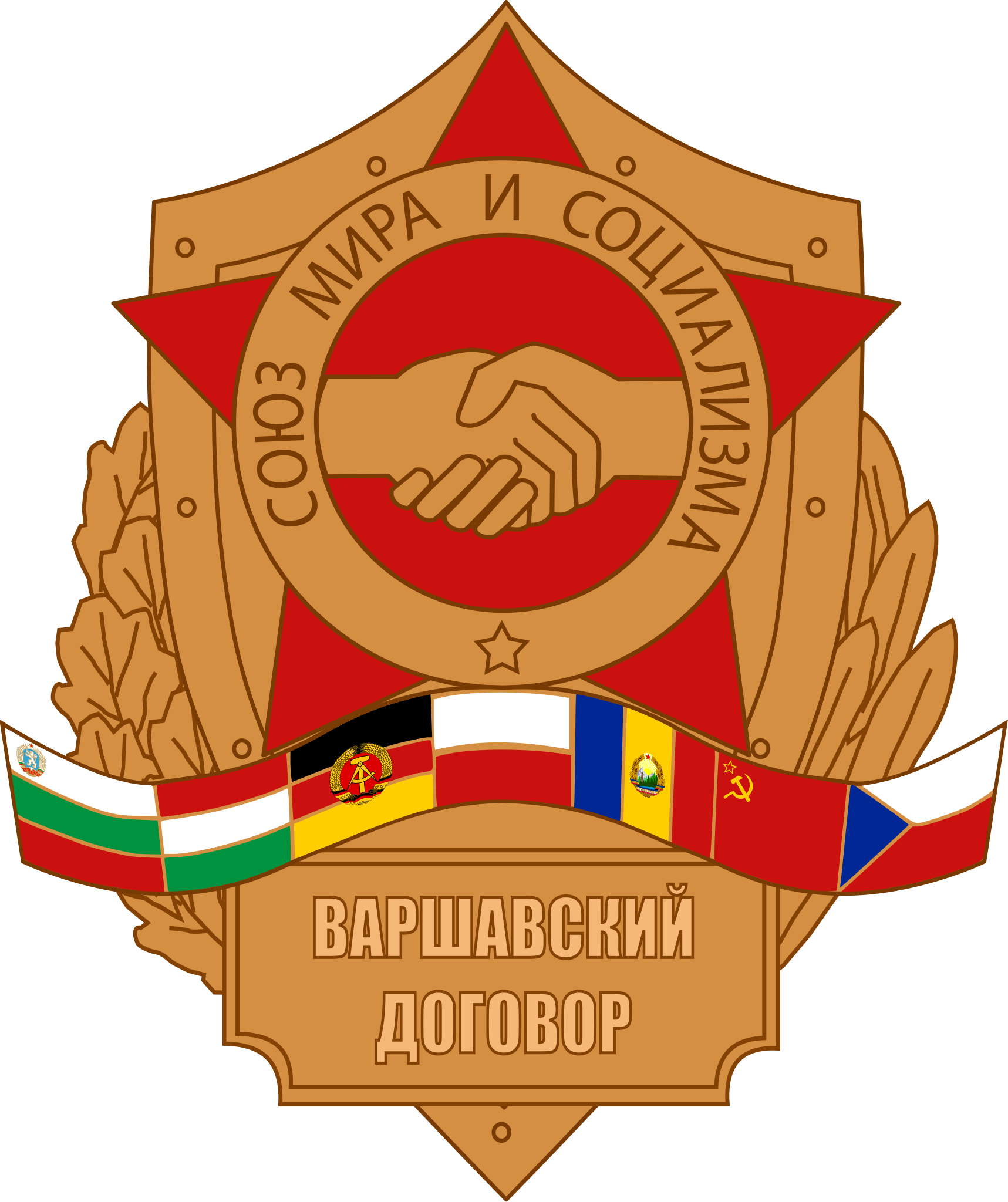CommissarMar (talk | contribs) mNo edit summary Tag: Visual edit |
CommissarMar (talk | contribs) mNo edit summary Tag: Visual edit |
||
| Line 1: | Line 1: | ||
[[File:Warsaw Pact logo.png|thumb|328x328px|Symbol of the [[Warsaw Pact]], a military alliance made up of Eastern Bloc states. ]] | [[File:Warsaw Pact logo.png|thumb|328x328px|Symbol of the [[Warsaw Pact]], a military alliance made up of Eastern Bloc states. ]] | ||
The '''Eastern Bloc''' was a group of countries in [[Eastern Europe]] that were [[Socialist state|socialist states]] allied with the [[Union of Soviet Socialist Republics|Soviet Union]]. After 1968, It included [[German Democratic Republic| | The '''Eastern Bloc''' was a group of countries in [[Eastern Europe]] that were [[Socialist state|socialist states]] allied with the [[Union of Soviet Socialist Republics|Soviet Union]]. After 1968, It included the [[German Democratic Republic (1949–1990)|GDR]], [[Polish People's Republic|Poland]], [[Czechoslovak Socialist Republic|Czechoslovakia]], [[Hungarian People's Republic|Hungary]], [[Socialist Republic of Romania|Romania]] and [[People's Republic of Bulgaria|Bulgaria]], all of which were part of the [[Warsaw Pact]]. The Eastern Bloc also included [[Socialist Federal Republic of Yugoslavia|Yugoslavia]] until 1948 and [[People's Socialist Republic of Albania|Albania]] until 1961. The Eastern Bloc opposed the [[United States of America|US]]-backed [[Western Bloc]] and [[North Atlantic Treaty Organization|NATO]]<ref>{{Citation|author=David S. Yost|year=1998|title=NATO Transformed: The Alliance's New Roles in International Security|chapter=|section=|page=31|quote=|pdf=https://archive.org/details/natotransformeda0000yost/page/31/mode/2up|city=Washington, DC|publisher=Institute of Peace Press|isbn=187837981X|doi=|lg=|mia=|title-url=|chapter-url=|trans-title=|trans-lang=}}</ref> and was targeted by the [[Central Intelligence Agency|CIA]] propaganda outlet [[Radio Free Europe/Radio Liberty|Radio Free Europe]]. | ||
== Legacy == | == Legacy == | ||
Latest revision as of 21:13, 6 December 2023

The Eastern Bloc was a group of countries in Eastern Europe that were socialist states allied with the Soviet Union. After 1968, It included the GDR, Poland, Czechoslovakia, Hungary, Romania and Bulgaria, all of which were part of the Warsaw Pact. The Eastern Bloc also included Yugoslavia until 1948 and Albania until 1961. The Eastern Bloc opposed the US-backed Western Bloc and NATO[1] and was targeted by the CIA propaganda outlet Radio Free Europe.
Legacy
Polls
See main article: Communist nostalgia
In Bulgaria, 62% of people say life was better under socialism and 18% say it was about the same. In Hungary, only 8% say life is better now and 72% say it was better under socialism.[2] In Romania, 69% say that life was better under socialism.[3] 57% of eastern Germans also defended the GDR in 2009 and said that it had more good sides than bad.[4]
References
- ↑ David S. Yost (1998). NATO Transformed: The Alliance's New Roles in International Security (p. 31). [PDF] Washington, DC: Institute of Peace Press. ISBN 187837981X
- ↑ "End of Communism Cheered but Now with More Reservations" (2010-04-10). Pew Research Center. Retrieved 2022-01-01.
- ↑ "'Con el comunismo se vivía mejor': el 66% de los rumanos votaría al dictador Ceausescu" (2014-10-04). El Mundo. Retrieved 2022-01-01.
- ↑ Julia Bonstein (2009-07-03). "Majority of Eastern Germans Feel Life Better under Communism" Spiegel International. Retrieved 2022-01-01.